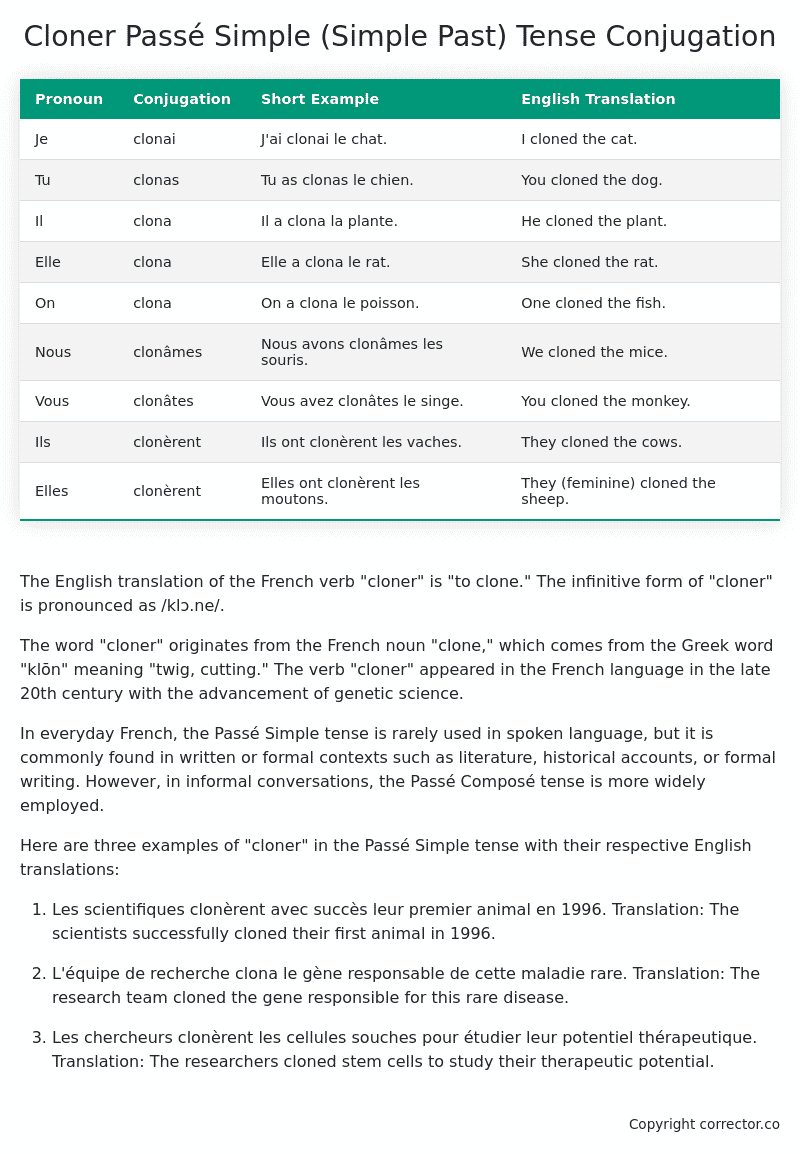Passé Simple (Simple Past) Tense Conjugation of the French Verb cloner
Introduction to the verb cloner
The English translation of the French verb “cloner” is “to clone.” The infinitive form of “cloner” is pronounced as /klɔ.ne/.
The word “cloner” originates from the French noun “clone,” which comes from the Greek word “klōn” meaning “twig, cutting.” The verb “cloner” appeared in the French language in the late 20th century with the advancement of genetic science.
In everyday French, the Passé Simple tense is rarely used in spoken language, but it is commonly found in written or formal contexts such as literature, historical accounts, or formal writing. However, in informal conversations, the Passé Composé tense is more widely employed.
Here are three examples of “cloner” in the Passé Simple tense with their respective English translations:
-
Les scientifiques clonèrent avec succès leur premier animal en 1996.
Translation: The scientists successfully cloned their first animal in 1996. -
L’équipe de recherche clona le gène responsable de cette maladie rare.
Translation: The research team cloned the gene responsible for this rare disease. -
Les chercheurs clonèrent les cellules souches pour étudier leur potentiel thérapeutique.
Translation: The researchers cloned stem cells to study their therapeutic potential.
Table of the Passé Simple (Simple Past) Tense Conjugation of cloner
| Pronoun | Conjugation | Short Example | English Translation |
|---|---|---|---|
| Je | clonai | J’ai clonai le chat. | I cloned the cat. |
| Tu | clonas | Tu as clonas le chien. | You cloned the dog. |
| Il | clona | Il a clona la plante. | He cloned the plant. |
| Elle | clona | Elle a clona le rat. | She cloned the rat. |
| On | clona | On a clona le poisson. | One cloned the fish. |
| Nous | clonâmes | Nous avons clonâmes les souris. | We cloned the mice. |
| Vous | clonâtes | Vous avez clonâtes le singe. | You cloned the monkey. |
| Ils | clonèrent | Ils ont clonèrent les vaches. | They cloned the cows. |
| Elles | clonèrent | Elles ont clonèrent les moutons. | They (feminine) cloned the sheep. |
Other Conjugations for Cloner.
Le Present (Present Tense) Conjugation of the French Verb cloner
Imparfait (Imperfect) Tense Conjugation of the French Verb cloner
Passé Simple (Simple Past) Tense Conjugation of the French Verb cloner (You’re reading it right now!)
Passé Composé (Present Perfect) Tense Conjugation of the French Verb cloner
Futur Simple (Simple Future) Tense Conjugation of the French Verb cloner
Futur Proche (Near Future) Tense Conjugation of the French Verb cloner
Plus-que-parfait (Pluperfect) Tense Conjugation of the French Verb cloner
Passé Antérieur (Past Anterior) Tense Conjugation of the French Verb cloner
Futur Antérieur (Future Anterior) Tense Conjugation of the French Verb cloner
Subjonctif Présent (Subjunctive Present) Tense Conjugation of the French Verb cloner
Subjonctif Passé (Subjunctive Past) Tense Conjugation of the French Verb cloner
Subjonctif Imparfait (Subjunctive Imperfect) Tense Conjugation of the French Verb cloner
Subjonctif Plus-que-parfait (Subjunctive Pluperfect) Tense Conjugation of the French Verb cloner
Conditionnel Présent (Conditional Present) Tense Conjugation of the French Verb cloner
Conditionnel Passé (Conditional Past) Tense Conjugation of the French Verb cloner
Conditionnel Passé II (Conditional Past II) Tense Conjugation of the French Verb cloner
L’impératif Présent (Imperative Present) Tense Conjugation of the French Verb cloner
L’impératif Passé (Imperative Past) Tense Conjugation of the French Verb cloner
L’infinitif Présent (Infinitive Present) Tense Conjugation of the French Verb cloner
L’infinitif Passé (Infinitive Past) Tense Conjugation of the French Verb cloner
Le Participe Présent (Present Participle) Tense Conjugation of the French Verb cloner
Le Participe Passé (Past Participle) Tense Conjugation of the French Verb cloner
Struggling with French verbs or the language in general? Why not use our free French Grammar Checker – no registration required!
Get a FREE Download Study Sheet of this Conjugation 🔥
Simply right click the image below, click “save image” and get your free reference for the cloner Passé Simple tense conjugation!

Cloner – About the French Passé Simple (Simple Past) Tense
Formation
Usage
Narration
Historical Context
Interactions with other tenses
Passé Composé
Imparfait
Conditional and Subjunctive
Summary
I hope you enjoyed this article on the verb cloner. Still in a learning mood? Check out another TOTALLY random French verb conjugation!


